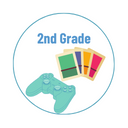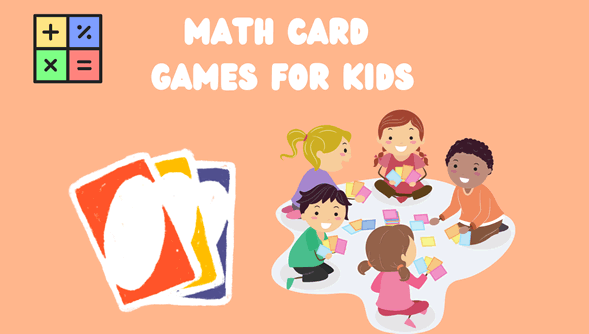Cool Maths Games i | Game-Based Learning
In today's digital age, technology has become an integral part of our lives. It has transformed various aspects, including education and learning. One area where technology has made a significant impact is in the realm of educational games. Among these, cool maths games have gained popularity for their ability to make learning mathematics fun and engaging. This article explores the world of cool maths games, their benefits, and how they can enhance mathematical skills in an enjoyable way.
Multiplication Games | Addition Games| Subtraction Games | Telling Time Games | Fraction Games |
Kindergarten Math Games

Play free preschool and kindergarten math games for kids. Fun math activities for kindergarten
Go to page1st Grade Math Games

Math games for 1st grade students to play games and practice different math topics. Maths games for class 1
Go to page2nd Grade Math Games

2nd grade math games for kids to play and practice math problems. Maths games for 2nd class
Go to page3rd Grade Math Games

3rd grade math games for kids to play and practice math problems. Maths games for class 3
Go to page4th Grade Math Games

4th grade math games for kids to play and practice math problems. Fun math activities for 4th graders
Go to page5th Grade Math Games

5th grade math games for kids to play and practice math problems. Cool math games for 5th graders
Go to page6th Grade Math Games

6th grade math games for kids to play and practice math problems. Math jeopardy 6th grade.
Go to page7th Grade Math Games

7th grade math games for kids to play and practice math problems. Math games for grade 7
Go to page
What are Cool Maths Games?
Cool maths games are interactive online games designed to teach and reinforce mathematical concepts in a playful and entertaining manner. These games cover a wide range of topics, from basic arithmetic to complex problem-solving. Unlike traditional classroom methods, cool maths games offer a more hands-on and immersive learning experience, making them ideal for students of all ages.
Benefits of Playing Cool Maths Games
-
Enhancing Problem-Solving Skills Cool maths games provide an excellent platform for developing problem-solving abilities. By presenting mathematical challenges in a game-like format, these games encourage players to think critically and devise strategies to solve problems efficiently. This skill is not only crucial for mathematics but also applicable to real-life situations.
-
Developing Logical Thinking Logical thinking is an essential aspect of mathematics. Cool maths games promote logical reasoning by requiring players to analyze situations, make connections between different concepts, and draw logical conclusions. This helps strengthen the brain's capacity for logical thinking, which is beneficial not only in mathematics but also in other academic disciplines.
-
Improving Mathematical Proficiency One of the primary objectives of cool maths games is to improve mathematical proficiency. By engaging in interactive gameplay, players reinforce their understanding of mathematical concepts, such as addition, subtraction, multiplication, division, geometry, and algebra. Regular practice through these games helps build a solid foundation in mathematics and enhances overall numerical fluency.
-
Fun and Engaging Learning Experience Learning becomes more effective when it is enjoyable and engaging. Cool maths games incorporate elements of fun and entertainment, making the learning process less daunting and more exciting. The interactive nature of these games motivates students to actively participate and explore mathematical concepts, leading to a deeper understanding and retention of knowledge.
-
Recommended Cool Maths Games for Different Age Groups
- Early Childhood (Ages 3-6)
- "Counting Caterpillar": Helps young children learn counting and number recognition through a visually appealing and interactive game.
- Elementary School (Ages 6-12)
- "Math Man": Reinforces addition, subtraction, multiplication, and division skills in a Pac-Man-like game setting.
- Middle School (Ages 12-15)
- "Prodigy Math Game": Offers a comprehensive curriculum aligned with school standards, covering various math topics through an adventure-based game.
- High School (Ages 15-18)
- "Sudoku": Challenges students with logical reasoning and critical thinking through solving number puzzles.
Safety and Online Privacy
When exploring cool maths games online, it is crucial to prioritize safety and online privacy. Parents and educators should ensure that the games are from reputable sources and have appropriate security measures in place. It is advisable to review the game's privacy policy and supervise children's online activities to safeguard their personal information.
Parental Involvement and Monitoring
While cool maths games can be valuable learning tools, parental involvement and monitoring are essential. Parents should actively engage with their children, discussing the concepts covered in the games and relating them to real-life scenarios. Regular communication and monitoring allow parents to ensure that their children are benefiting from these games and using them responsibly.
Conclusion
Cool maths games provide a unique opportunity to make learning mathematics enjoyable and effective. By incorporating elements of fun, interactivity, and engagement, these games enhance problem-solving skills, develop logical thinking, and improve mathematical proficiency. Parents, educators, and students can embrace the world of cool maths games to transform the way mathematics is learned and make it a delightful adventure of discovery.
FAQs:
-
Are cool maths games suitable for all age groups? Yes, cool maths games are designed to cater to various age groups, starting from early childhood to high school.
-
Can cool maths games improve mathematical proficiency? Absolutely! Cool maths games offer a fun and engaging way to reinforce mathematical concepts and enhance overall numerical fluency.
-
Are cool maths games safe for children to play online? While many cool maths games prioritize safety, it's essential for parents to ensure that their children access games from reputable sources and monitor their online activities.
-
How can parents get involved in their child's learning through cool maths games? Parents can actively engage with their children by discussing the concepts covered in the games, relating them to real-life scenarios, and monitoring their progress.
- Are cool maths games only focused on arithmetic? No, cool maths games cover a wide range of mathematical topics, including arithmetic, geometry, algebra, problem-solving, and logical reasoning.
-
Game-Based Learning: Unlocking Education Through Play
Introduction
In this digital age, traditional education methods are evolving to keep pace with the demands of modern learners. One innovative approach gaining popularity is game-based learning. By incorporating elements of games into educational experiences, this approach offers a captivating and effective way to teach and engage students. In this article, we will explore the concept of game-based learning, its benefits, how it works, its applications in education, examples, implementation strategies, challenges, and the future of this exciting learning paradigm.
What is Game-Based Learning?
Game-based learning is an educational methodology that integrates gaming elements, mechanics, and principles into the learning process. It leverages the inherent motivation and engagement found in games to enhance educational outcomes. Through interactive and immersive experiences, learners can acquire knowledge, develop skills, and solve problems in a fun and engaging environment.
Benefits of Game-Based Learning
Game-based learning offers a multitude of benefits for both students and educators. Here are some key advantages:
1. Increased Engagement and Motivation
Games inherently captivate and motivate players to achieve goals and overcome challenges. By integrating games into education, students become active participants, leading to higher levels of engagement and motivation. This increased enthusiasm can positively impact learning outcomes.
2. Enhanced Learning Experience
Game-based learning provides a dynamic and interactive experience that allows students to explore, experiment, and learn from their mistakes in a safe environment. This hands-on approach fosters deeper understanding, critical thinking, and problem-solving skills.
3. Personalized Learning Paths
Games can adapt to individual learners' abilities and progress, offering personalized learning paths. This customization ensures that each student receives tailored instruction and challenges appropriate to their skill level, maximizing their learning potential.
4. Immediate Feedback and Assessment
Games provide instant feedback, allowing learners to assess their performance in real-time. This prompt feedback helps students understand their strengths and weaknesses, enabling them to make adjustments and improve their understanding of the subject matter.
How Game-Based Learning Works
Game-based learning utilizes various game mechanics and elements to create effective learning experiences. Here are some common components found in game-based learning:
1. Goals and Objectives
Games have clear goals and objectives that players strive to achieve. In the context of education, these goals align with the desired learning outcomes. Students work towards these objectives, promoting a sense of purpose and accomplishment.
2. Challenges and Progression
Games present challenges and gradually increase their difficulty as players progress. This progressive difficulty ensures a continuous state of flow, where learners remain engaged and appropriately challenged. By facing increasingly complex tasks, students can develop their skills and knowledge.
3. Rewards and Feedback
Games often incorporate rewards and feedback systems to motivate players. In educational games, rewards can be in the form of points, badges, or unlocking new levels. Feedback provides learners with information on their performance, guiding them towards improvement.
4. Collaboration and Competition
Game-based learning can foster collaboration and healthy competition among students. Multiplayer games or cooperative gameplay encourages teamwork, communication, and problem-solving skills. Competition can motivate learners to excel and achieve better results.
Game-Based Learning in Education
Game-based learning has gained significant traction in educational institutions worldwide. Educators are recognizing its potential to revolutionize the learning process. By integrating games into the curriculum, teachers can enhance student engagement, increase participation, and improve academic performance.
Examples of Game-Based Learning
Numerous educational games showcase the power of game-based learning. Some notable examples include:
1. Minecraft: Education Edition
Minecraft, a popular sandbox game, offers an education-specific version that allows students to explore and build in virtual worlds. It promotes creativity, collaboration, and problem-solving skills.
2. Kahoot!
Kahoot! is a game-based learning platform that enables educators to create quizzes, surveys, and discussions. Students can actively participate and compete against their peers, fostering a lively and engaging classroom environment.
3. Prodigy
Prodigy is a math-based game that turns learning into an epic adventure. By solving math problems, students progress through a fantasy world, battling monsters and collecting treasures.
Implementing Game-Based Learning
To effectively implement game-based learning, educators should consider the following steps:
1. Align Games with Learning Objectives
Educators need to select games that align with specific learning objectives. The games should complement the curriculum and provide opportunities for students to develop the desired skills and knowledge.
2. Provide Adequate Support and Resources
Teachers should offer guidance and support to students as they engage with educational games. Providing necessary resources, instructions, and clarifications will help learners make the most of the gaming experience.
3. Integrate Games with Traditional Teaching
Game-based learning should be integrated with traditional teaching methods. Teachers can use games as supplemental tools, reinforcing concepts taught in the classroom and offering students a hands-on learning experience.
Challenges of Game-Based Learning
While game-based learning offers numerous benefits, it also comes with its share of challenges. Here are some common obstacles educators may encounter:
1. Access to Technology
Game-based learning often relies on technology, which may not be accessible to all students or schools. Limited access to devices, internet connectivity, or outdated equipment can hinder implementation.
2. Curriculum Integration
Integrating games into the curriculum requires careful planning and alignment. Educators need to ensure that games support the intended learning outcomes and fit within the existing educational framework.
3. Assessment and Evaluation
Traditional assessment methods may not be suitable for game-based learning. Educators need to develop new evaluation techniques to measure student progress, understanding, and mastery of skills acquired through games.
Future of Game-Based Learning
As technology continues to advance, game-based learning is poised to play an even more prominent role in education. Virtual reality (VR), augmented reality (AR), and artificial intelligence (AI) will further enhance the immersive and personalized nature of educational games, providing students with transformative learning experiences.
Conclusion
Game-based learning offers a compelling and effective approach to education, leveraging the power of games to engage, motivate, and educate students. By embracing this innovative methodology, educators can unlock the potential of their students and create dynamic learning environments. As the future unfolds, game-based learning is set to revolutionize education, empowering learners worldwide.
FAQs
Q1: Is game-based learning suitable for all age groups? A1: Yes, game-based learning can be adapted for various age groups, from early childhood to adult learners. Games can be tailored to align with specific age-appropriate content and learning objectives.
Q2: How can educators address the challenges of limited technology access? A2: Educators can explore alternative solutions such as mobile learning or utilizing computer labs within schools. Additionally, advocating for increased access to technology resources can help overcome this challenge.
Q3: Can game-based learning replace traditional teaching methods? A3: Game-based learning should be seen as a complementary approach rather than a complete replacement for traditional teaching methods. It enhances learning by providing an interactive and engaging experience.
Q4: Are there game-based learning platforms available for educators? A4: Yes, there are various game-based learning platforms available, such as Classcraft, Quizlet, and CodeCombat. These platforms provide educators with a range of educational games and resources to support their teaching.
Q5: Where can I find resources to incorporate game-based learning in my classroom? A5: Online educational platforms, educational app stores, and professional development workshops often provide resources and guidance on implementing game-based learning. Exploring these avenues can help educators find suitable games and strategies for their classrooms.
Benefits of Educational Video Games
Educational video games provide numerous benefits to children. They promote critical thinking, problem-solving, creativity, and strategic planning skills. These games also enhance hand-eye coordination, fine motor skills, and spatial awareness. Moreover, educational video games encourage teamwork and collaboration when played with friends or siblings.
Preschool Educational Video Games
- "ABC Adventure": An interactive game that teaches preschoolers the alphabet through engaging activities.
- "Counting Caterpillar": A fun game that helps children learn counting and basic math skills.
- "Shapes and Colors Safari": An adventure game that introduces kids to various shapes and colors.
Math and Logic Educational Video Games
- "Math Mastermind": A challenging game that improves math skills through puzzles and problem-solving.
- "Number Ninjas": A game that teaches arithmetic operations and number sequencing in a ninja-themed world.
- "Logic Labyrinth": An interactive puzzle game that enhances logical reasoning and critical thinking.
Language and Literacy Educational Video Games
- "Word Wizards": A game that helps children improve their vocabulary and spelling skills.
- "Storybook Adventures": An immersive game that encourages reading comprehension and storytelling.
- "Grammar Galaxy": An intergalactic game that teaches grammar rules and sentence construction.
Science and Nature Educational Video Games
- "Eco Explorers": A game that educates children about the environment and conservation.
- "Dinosaur Discovery": An adventure game where kids explore the prehistoric world and learn about dinosaurs.
- "Space Odyssey": A cosmic journey that teaches children about astronomy and the solar system.
History and Geography Educational Video Games
- "Time Travelers": An interactive game that takes kids on a time-traveling adventure to learn about historical events.
- "World Wonders": A virtual tour game that explores famous landmarks and introduces world geography.
- "Civilization Builders": A strategy game that allows children to build and manage ancient civilizations.
Coding and Computer Science Educational Video Games
- "Code Quest": A game that introduces coding concepts and problem-solving through programming challenges.
- "Robo Builders": A game where kids can design and program their own robots, learning the basics of robotics.
- "Cyber Defenders": A cybersecurity game that educates children about online safety and digital citizenship.
Creativity and Problem-Solving Educational Video Games
- "Art Studio": An artistic game that enables children to express their creativity through painting and drawing.
- "Puzzle Masters": A collection of challenging puzzles and brain teasers to enhance problem-solving skills.
- "Invention Lab": A game that sparks innovation and critical thinking by allowing kids to create their own inventions.
Social Studies and Life Skills Educational Video Games
- "Community Heroes": A game that teaches children about different professions and their roles in society.
- "Financial Future": A game that introduces basic financial concepts and money management skills.
- "Healthy Habits": An interactive game that promotes healthy lifestyle choices and personal well-being.
Conclusion
Educational video games offer a captivating and effective way to engage children in learning. With a vast array of subjects and themes, these games provide an opportunity for kids to acquire knowledge, develop skills, and explore various educational concepts in an interactive and enjoyable manner. By incorporating educational video games into their routine, parents and educators can make learning a fun and engaging experience for children.
FAQs
-
Are educational video games suitable for children of all ages?
- Yes, there are educational video games available for children of different age groups. From preschoolers to teenagers, there are games tailored to specific age ranges and learning levels.
-
Can educational video games replace traditional learning methods?
- Educational video games should be seen as a supplement to traditional learning methods rather than a replacement. They provide an interactive and engaging learning experience, but a balanced approach that includes various learning activities is ideal.
-
Are educational video games addictive?
- While some children may get engrossed in playing video games, it's important for parents to set limits and ensure a healthy balance between gaming and other activities. Moderation and parental guidance are key.
-
How can I choose the right educational video game for my child?
- Consider your child's interests, age, and learning goals. Read reviews, check ratings, and look for games that align with the subjects or skills you want your child to focus on.
-
Are educational video games only available on specific gaming platforms?
- Educational video games are available on various platforms, including consoles, computers, tablets, and smartphones. Choose a platform that is suitable for your child and offers a wide range of educational game options.











